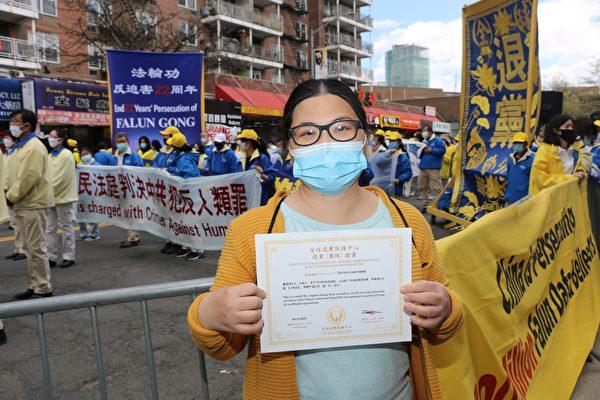Earlier this year, several cities in northern China’s Hebei province—Nangong, Xingtai, Langfang, and Shijiazhuang—were all placed under strict lockdown following an outbreak of the CCP virus, commonly known as the novel coronavirus.
Zhao Lan and her husband Chen Hai (both pseudonyms) served as volunteers in their community in Nangong during the lockdown, bringing food to households that suffered from shortages.
Disinfection Turned Into Ransacking
On Jan. 24, when two other volunteers in their community tested positive for the CCP virus, the couple were immediately sent to a local quarantine center.Before the couple left their house, the local authorities took away their house keys to carry out a disinfection of their home. But what was supposed to be a general sterilization quickly transformed into a ransacking.
Most of the couple’s personal belongings were thrown away by the authorities without their consent—including their bank cards, wallet and purses, cellphones, business license, accounting books, and other valuables.
Zhao said, “The first thing I saw when I got back home was that as far as my eyes could see, except for the large pieces of furniture, nothing was left, not even a kettle for drinking water.”
Authorities did not tell the couple that they were going to remove their belongings.
What makes Zhao particularly sad is that her daughter’s belongings were also discarded.
Protracted Quarantine
However, the ransacking of their home was not the most disturbing thing that happened to the couple. Chen has been in quarantine alone for more than 70 days, with no idea of when he will be released.According to Zhao, on Jan. 23, the day before he was placed in quarantine, Chen took a shower with the window open to let in the air. He probably caught a cold as a result and had a slight fever the next day. Consequently, he was sent to Xingtai No. 2 Hospital under observation.
Zhao said that her husband no longer had any fever upon arrival at the hospital. While he stayed in isolation there, he was given no treatment, except for some liver protection pills.
On March 5, when Chen was discharged from the hospital, he was told to stay in quarantine at home for another 14 days. Meanwhile, the hospital refused to show him his own medical records.
To avoid all family members being forced into quarantine, Chen stayed alone at another location away from his home, and his wife delivered meals for him every day.
But after the 14-day quarantine concluded, the couple were told again that Chen must remain in quarantine for another month.
Chen said: “I have been quarantined for more than 70 days, and now the authorities have told me that I am a high-risk suspect with the coronavirus, but I’ve never been allowed to see my medical records. Since I came back on March 5, I have taken a CT showing that everything is normal.”
Yet authorities have given Chen no choice but to comply.
“A few days ago my wife had a heart attack and the hospital needs me to be there to sign the paperwork, but they simply told me, ‘You are not allowed to go out—not even for weddings or funerals,’” Chen said.
The authorities want him to sign an agreement to stay in quarantine at home and apply for a subsidy of up to 5,000 yuan ($750).
Chen said: “I have never tested positive, never! You can keep treating me like a suspect, but you can’t mess up my life like this. I'd rather not get any subsidies.”
Zhao disclosed that by signing the agreement, Chen must “rest at home for one more month, and then submit himself under strict watch for another three to six months.”
The couple refused to sign the agreement, and the authorities installed surveillance cameras at the entrance of their home.
Zhao said: “My husband is now mentally depressed. He has been forced into quarantine alone at home for too long. He’s changed completely into a different person, becoming very easily irritated with people around him.”
To make matters worse, the protracted quarantine imposed on Chen has prevented him from going back to work, pushing the family’s finances and livelihood to the verge of ruin.
Zhao said that her husband is the only breadwinner in the family. The relentless quarantine has inflicted a devastating financial blow. Saddled with car loans and a mortgage, they also have to take care of elderly relatives who are in poor health and need medical care. “We can’t take it any longer,” she added.
Authorities Don’t Care if People Live or Die
What depresses the couple even more is the authorities’ indifference to their plight.Chen said, “When I returned home, they promised that I’d be out of quarantine as soon as I stayed at home for 14 days.”
However, Chen was immediately forced into extended quarantine when the 14-day period ended. He began calling the local authorities about when he would be set free from isolation. Initially, there was someone answering his calls, but the response would always be, “Wait a couple more days, we’ll have a meeting to decide.”
As time passed, Chen said he has became more and more depressed. Now when he calls again, nobody picks up the phone. They have told Chen, “You don’t have the right to call us here, you should instead call your community office and ask them to report to us about your case—one level at a time.”
Now Chen feels getting stuck, without knowing what to do next to end his family’s plight.
The authorities don’t care if people can survive the lockdown measures—as long as people submit to stay at home, Chen said. “All they care about is how to protect their vested interests and how to hang on to their posts. As for people like us? They don’t care if you live or die,” he said.





